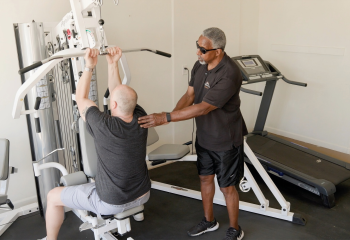More About Rehabs Accepting GEHA
Rehab that Accepts GEHA
Government Employees Health Association (GEHA) insures federal employees across the United States, and some drug and alcohol rehab centers accept GEHA insurance . However, it can be difficult to know which centers are the best fit for your specific needs.
About GEHAFounded in 1937, GEHA was one of the first carriers to provide federal employees with health insurance plans under the Federal Employees Health Benefits Act. GEHA offered their plans to current and retired federal employees in all government branches.
Now, GEHA is one of the largest benefit providers in the United States, offering dental and clinical benefits exclusively for postal and federal employees. They also provide benefits for military retirees and their families, and annuitants.
GEHA Insurance Plan Options
GEHA, like most health insurance companies, offers coverage for substance abuse treatment . This can include inpatient and outpatient treatment, counseling, and medication-assisted treatment.
The specific details of GEHA's substance abuse coverage will depend on the specific plan you have. You can contact GEHA directly or look at your plan's coverage details online to learn more about what substance abuse services it covers.
GEHA’s has 5 plans with varying offerings, deductibles, and coverage. All plans include preventative care, nationwide coverage, telehealth visits, discounts, incentives, and a 24/7 health advice line. Neither plan requires a referral.
- Elevate : offers one of the lowest national premiums, free virtual doctor visits, low copays, and vision coverage. Complete wellness focus, cost-conscious, designed for people early in their careers who don’t use their plan often, and won’t often need prescription medications.
- HDHP : low premium, no-cost preventive care. Puts money in your HSA each month. A non-traditional plan, focused on saving for the future, designed for all career stages. Lower deductible than most FEHB plans. Vision benefits and free virtual doctor visits.
- Standard : comprehensive coverage for all life and career stages, 100% maternity coverage, low copays, vision focus. Designed for average use of plan and medications.
- Elevate Plus : low deductibles, low co-pays for alternative care, digital wellness, vision and maternity coverage. Designed for mid-career single adults and families who will use their plan often, and need prescriptions often.
- High : brand-name and specialty prescriptions, hearing aid benefit, maximum coverage, can combine with Medicare. For late-career adults who will use their plan very often and need brand-name prescriptions very often.
GEHA, Medicare and Medicaid
GEHA Medicare supplement Original Medicare, which is the federal health insurance program for people who are 65 or older, as well as people with certain disabilities. GEHA’s 5 medical plans all work with Medicare to cover any unmet costs.
The specifics of what is covered by GEHA Medicare plans will vary depending on the plan you have and the state you live in. To find out more about what is covered by GEHA's Medicare plans, you can look at your plan's coverage details or contact GEHA directly.
Addiction Treatment Options
GEHA for Medical Detox
GEHA typically covers medically-supervised detox programs, which involve the use of medication and other treatments to help individuals manage the physical and emotional symptoms of withdrawal from drugs or alcohol. In some cases, GEHA may also cover the cost of inpatient or residential detox programs, which provide a more intensive level of care and support.
GEHA and Medically-Assisted Treatment:
MAT is a form of rehab that combines medication with therapy to help those recovering from addiction. GEHA insurance covers many forms of MAT, including methadone and buprenorphine.
GEHA for Residential Treatment
Inpatient treatment is the most intensive form of rehab , and it typically involves staying at the center for several weeks or months. Inpatient treatment is ideal for those with severe addiction or mental health issues.
Intensive Outpatient Programs (IOP)
Intensive outpatient treatment is less intensive than inpatient treatment, and it typically involves visiting the center for a few hours a day. Outpatient treatment is ideal for those who need to continue working or taking care of their family while in rehab.
Partial Hospitalization Programs (PHP)
Partial hospitalization typically involves staying at the center for several hours a day. Partial hospitalization is ideal for those who need a higher level of care than outpatient treatment but do not require 24-hour supervision.









































































